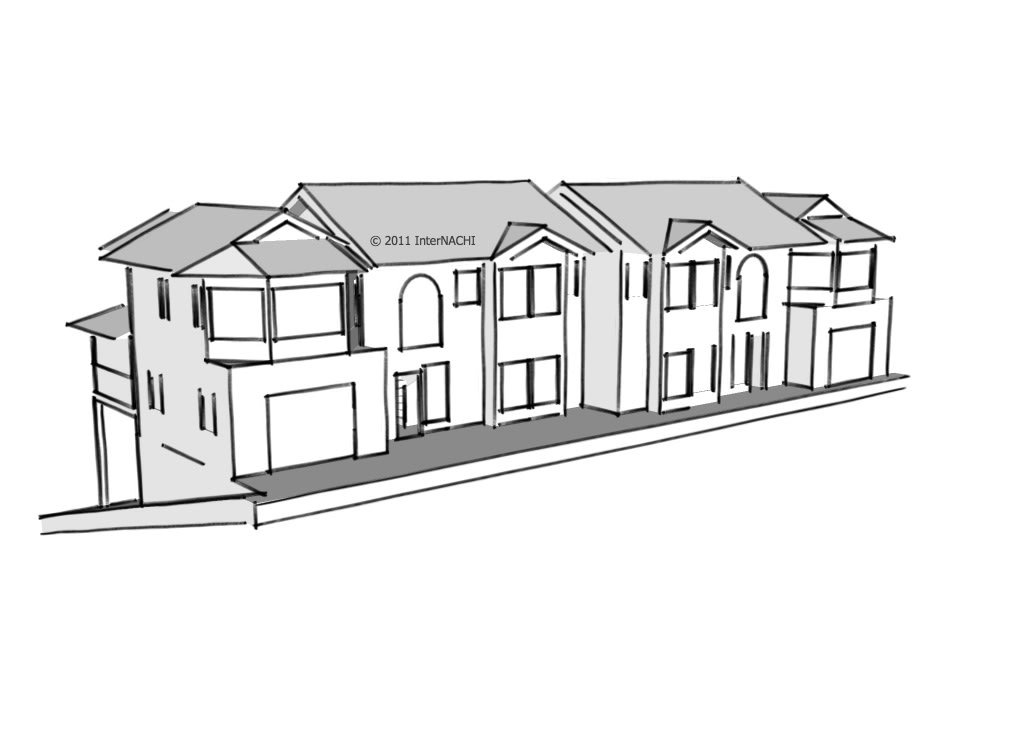A multi-unit residential property inspection is performed for a range of clientele, including mortgage lenders, investors, condominium associations, and property managers, and for a variety of different real estate transactions, or as part of a standard maintenance and repair strategy.
Unlike most commercial properties, a multi-dwelling property experiences continual usage as long as the unit is occupied or during the operating hours of a communal space, resulting in wear and tear by occupants and visitors to varying degrees. Some occupants or renters may maintain their unit responsibly; others may not, even if they’re contractually required to. Some tenants may own pets, which adds to the normal amount of wear and tear. And some unoccupied units may suffer from neglect or deferred maintenance, and even vandalism by trespassers. Regardless of the client’s objective for the inspection, having the physical condition of the property assessed by a commercial inspection professional is especially important from both a financial standpoint and a safety perspective.
A multi-dwelling property is also known as a multi-family residential property or multi-unit housing. An inspection for this type of residential property is performed for apartment buildings, condominiums, and townhome developments. Although the interior of each individual unit is similar to a standalone residential property and typically inspected by a home inspector, a multi-dwelling property is designed and built with commercial applications and entail systems and features that require the core competency of a commercial inspector. A commercial inspection may also be mandated by the mortgage lender, oversight association, or authority having jurisdiction based on the property’s zoning and purpose.
About the Commercial Property Inspection
The commercial property inspector will comply with the International Standards of Practice for Inspecting Commercial Properties (ComSOP). The ComSOP is the industry-accepted commercial inspection guideline. It’s a proven process and system.
A commercial inspection is a thorough visual examination of the condition of the property. It provides the client with an inventory of the building’s major systems and components and an assessment of their physical and functional condition. These findings will highlight the property’s strengths and potential deficiencies related to:
-
- normal wear and tear;
- poor workmanship of original installation, repairs and/or upgrades;
- inadequate design for use or occupancy;
- deferred maintenance;
- environmental impact or damage;
- outdated systems or components; and
- systems near the end of their service life.
How the Inspection Helps the Client
A commercial inspection of multi-unit housing can assist the client with:
-
- developing a pre-purchase strategy. The findings documented in the inspection report will help the client develop a strategy for negotiation if they’re acquiring the property or proposing a change in its use;
- preserving the site. The findings documented in the inspection report will assist the client in better sustaining the property’s grounds. This way, residents can enjoy a safe, well-kept, and healthy outdoor environment. This may also increase its curb appeal by attracting future residents (and retaining existing ones), as well as ensuring its greatest resale value; and
- evaluating the property’s maintenance needs. The findings documented in the inspection report will provide the client with insights on how well past or present maintenance has been performed in order to budget for ongoing upkeep, as well as necessary upgrades. This information is also critical for assessing staffing needs, and even tenant rules.
All buildings have physical deficiencies, which can cause the structure to degrade and depreciate if they’re not addressed in a timely manner. The inspector will provide his/her objective findings for the client’s consideration so that they can realize the greatest return on their investment.
Schedule a Commercial Property Inspection
Every commercial property inspection project is different. The prospective client should contact a member of the Certified Commercial Property Inspectors Association to discuss the specific needs for their project, and they can learn more about what to expect and how to prepare for a commercial property inspection.
A commercial property inspection will pay for itself many, many times over. It is crucial when assessing the strength and long-term viability of a capital asset.


